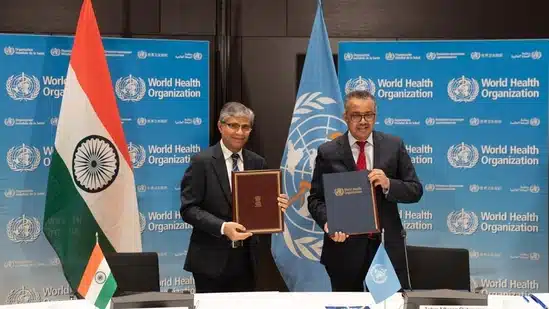India Affirms Support for WHO Global Traditional Medicine Strategy at 78th Meeting

At the 78th World Health Assembly (WHA) in Geneva, India reaffirmed its commitment to enhancing Traditional Medicine (TM) systems as part of a comprehensive healthcare strategy. Representing India, Shri Arindam Bagchi, the Permanent Representative to the United Nations in Geneva, expressed support for the newly adopted WHO Global Traditional Medicine Strategy 2025–2034. He highlighted India’s ongoing efforts to incorporate evidence-based traditional practices into both national and global health frameworks, showcasing a model that other nations could emulate.
India’s Leadership in Traditional Medicine
Under the leadership of Prime Minister Shri Narendra Modi, India has been at the forefront of integrating modern medicine with scientifically validated traditional systems, including Ayurveda, Yoga, Unani, and Siddha. During his address, Mr. Bagchi emphasized that India’s approach serves as a practical model for other countries. He noted the nation’s strong leadership in implementing the previous WHO Traditional Medicine Strategy (2014–2023) and expressed enthusiasm for the new framework. This commitment reflects India’s dedication to fostering a healthcare system that values both modern and traditional practices, aiming to improve health outcomes for its citizens and beyond.
Establishment of the WHO Global Traditional Medicine Centre
India’s significant contributions to the global TM landscape are exemplified by the establishment of the WHO Global Traditional Medicine Centre (GTMC) in Jamnagar, Gujarat. Launched in 2022, the Centre was inaugurated by Prime Minister Modi and WHO Director-General Dr. Tedros Adhanom Ghebreyesus. This pioneering facility plays a crucial role in data analytics, policy support, standard-setting, and research collaboration, marking a significant step in the global integration of traditional medicine. The Centre aims to enhance the understanding and application of traditional practices, ensuring they are recognized and utilized effectively within the global health framework.
New Developments in Traditional Medicine Classification
A notable advancement this year was the signing of a Donor Agreement between the Ministry of Ayush and WHO on May 24, 2025. This agreement aims to develop a dedicated Traditional Medicine module under the International Classification of Health Interventions (ICHI). Prime Minister Modi praised this milestone during his “Mann Ki Baat” address, stating that it would enable Ayush systems to reach a broader audience through a scientific and standardized framework. Vaidya Rajesh Kotecha, Secretary of the Ministry of Ayush, emphasized India’s pride in contributing to the global integration of Traditional Medicine, highlighting the importance of scientific credibility and global recognition for Ayush systems.
Commitment to Global Health and Sustainability
According to a news release from the WHO, the new strategy encourages Member States to enhance regulation, integrate TM services where appropriate, and uphold indigenous knowledge, environmental sustainability, and biodiversity. India’s initiatives align closely with these principles, reinforcing its role as a dedicated partner in promoting traditional medicine for global well-being. The country remains committed to supporting WHO and other Member States in realizing the full potential of Traditional Medicine, aiming to achieve universal health coverage and contribute to the Sustainable Development Goals.
Observer Voice is the one stop site for National, International news, Sports, Editor’s Choice, Art/culture contents, Quotes and much more. We also cover historical contents. Historical contents includes World History, Indian History, and what happened today. The website also covers Entertainment across the India and World.
Follow Us on Twitter, Instagram, Facebook, & LinkedIn

